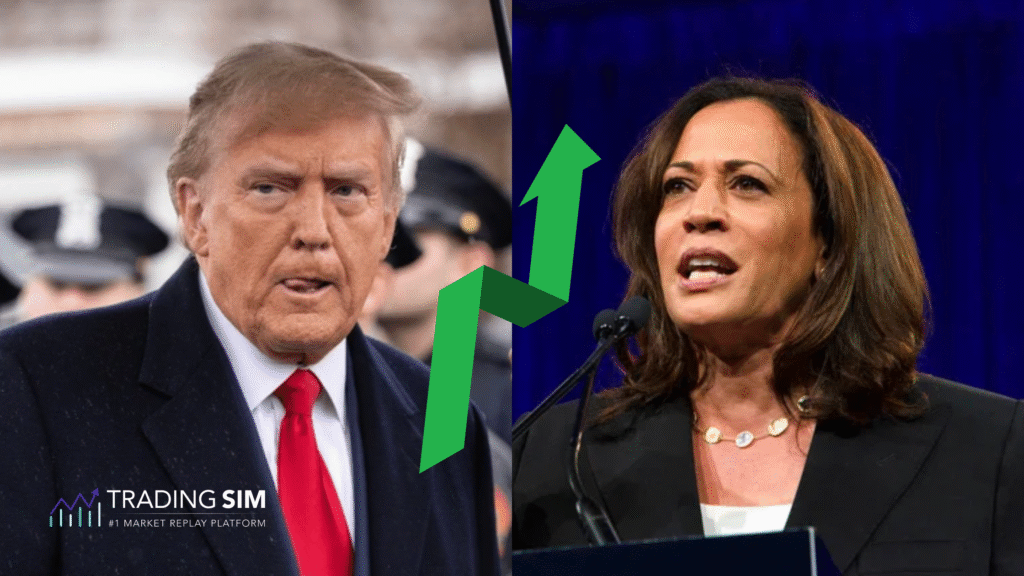Inflation Control Measures
Trump considers deregulation, lowering corporate and individual taxation, and increased oil production as potential ways to lower inflation and bring down prices.
While the inflation rate is at its lowest level at 2% in three years, it has remained a challenge for the Biden administration since the post-covid period. Kamala Harris intends to enact a federal law that would bar companies from charging exorbitant prices or “price gouging.” In particular she highlighted unfair practices such as price fixing in various meat processing companies. The proposed law would empower the Federal Trade Commission to investigate malpractice and penalize the food and grocery industry, with heightened scrutiny of mergers in the sector.
Earlier this year, the Federal Trade Commission sued to block Kroger’s $24.6 billion proposed purchase of rival Albertsons for fears of price gouging and anti-competitive practices.
The Biden administration adopted the same approach in 2021, calling for punitive actions on price fixing, enforcing antitrust laws in the meat processing industry, and funding smaller firms to increase competition among players in the sector.
To lower prescription drug prices, Kamala Harris proposed to extend the $35 cap on insulin price across the board, which was previously meant only for seniors. Additionally, a $2,000 cap on out-of-pocket expenses for prescription drugs has also been proposed.
Energy and Other Policies
Donald Trump has been quite open about increasing fossil fuel production, while Kamala Harris’s policy on cutting fossil fuel in favor of green energy has been somewhat ambiguous. Even under Biden, the fossil-based fuel production reached record highs, with profits of big oil firms soaring despite his initial tough talk on Big Oil. In addition, the Biden administration didn’t tax the windfall profits generated by oil companies due to soaring oil prices in the aftermath of the Russian invasion of Ukraine, unlike various European governments.
“Under my administration, we will be slashing energy and electricity prices by at least half, within 12 months – 18 months max,” addressed Trump to a rally covered by Fox News.
Trump plans to further increase oil outputs by removing oil and gas drilling regulations, which according to him, would not only help reduce energy prices but also contribute to lowering inflation. He also aims to scale back renewable energy policies already in place and will withdraw from the Paris Agreement on climate change. Trump believes these actions would lead the US to achieve “energy dominance.”
Trump is also against electric vehicle subsidies and considers it counterproductive for the auto industry. He intends to repeal those policies and support the traditional American car industry.
The two candidates’ views differ on the Fed’s monetary policy as well. According to Trump, “the president should have at least [a] say” in monetary policy or interest rates, but Kamala promised to avoid interference in the working of the Federal Reserve.
“The Fed is an independent entity and as president I would never interfere in the decisions that the Fed makes,” she told reporters.

Given the presidential candidates’ proposed economic agenda, let’s explore how financial markets can react to their policy decisions when one of them assumes power.
Donald Trump’s Leadership
The economic policies highlighted by Trump during his election campaign so far could have a significant impact on individual stocks, sectors, the overall stock market, commodity markets, currency markets, and bond market as well.
His promised corporate and individual tax cuts could be a positive sign for the stock market as a reduction in corporate tax has the potential to boost corporate income. Slashing individual taxes would increase individuals’ real income. The increase in consumers’ real income could increase spending, which would benefit corporations and businesses.
Stock markets are also likely to respond positively to deregulation as businesses want to work in deregulated environments, allowing them to execute their strategies liberally. This is particularly true for the oil and financial services industry which Trump aims to deregulate, so financial services stocks and oil stocks could see a rally if Trump comes to power.
Big tech companies that are facing antitrust lawsuits are also likely to benefit from a Trump win because of his softer antitrust approach than his counterparts Kamala Harris and Joe Biden.
Trump’s proposed tariff hikes on Chinese imports are a potential red flag, though, which could lead to a trade war with China. China could retaliate with equal tariffs. Higher tariffs on Chinese imports might impact the profitability of big US tech companies like Apple, Tesla, and Microsoft that rely on China for sales. Their supply chains for goods will become costlier with the increase in tariffs. The investor concerns from a potential trade war could initiate a sell-off in the stock market. Though, when Trump raised tariffs in his initial term of office, the market appeared to brush off the trade war fears. Technology, consumer goods, agriculture, and industrials and manufacturing sectors are the top-most sectors exposed to China, and those sectors will be the ones to watch if Trump wins and follows through on his tariffs agenda.
Renewable energy and EV stocks might also see volatility given Trump’s proposal to roll back the current incentives provided to companies operating in these sectors.
Yields on US treasuries could also see volatility as a result of a rise in tariffs as investors rush to seek refuge in safer assets. The US dollar would likely strengthen against the Chinese Yuan because of the USD status as a safe-haven currency during turbulent times. A strong US dollar could make US made products costlier to the outside world, making them less competitive. China may respond with depreciating their currency, the Chinese Yuan, to make their exports cheaper despite the tariffs.
Kamala Harris’s Leadership
Considering Kamala Harris’s economic agenda regarding regulation of industries and price control mechanisms, some sectors such as retail or oil and gas might slide if Kamala wins. However, it remains to be seen how strictly she acts in response to “price gouging” and abolishing anti-competitive practices in some industries like meat processing.
While Kamala is in favor of slashing tax cuts on individuals and providing tax credits to low- and middle-income families with newborn babies, she proposes to fund the cuts by increasing additional taxes on corporations and high net worth individuals. Corporations could suffer in the markets because of the added tax burdens on their bottom line.
On tariffs, Kamala is likely to take a comparatively softened approach than her counterpart Trump, alleviating fears of a trade war with China and keeping the status quo for companies with major exposure to China.
Trump also hinted at influencing the Central bank’s monetary policy, which could have negative repercussions for the national debt structure and stock market. Kamala, however, clearly stated that she would not interfere in the Federal Reserve’s monetary policy.
The US senate elections will also be held on November 5th, the same date on which US presidential election will be held. Voters will not only choose their president but also the senate representatives as well. So, whether or not Kamala or Trump wins, their power to implement their respective taxation and spending agendas will depend on their supportive strength in the House of Representatives and the Senate.
In the event either Trump or Kamala wins without the supporting majority in Congress, they both would face trouble in legislating and passing bills relating to their agenda. Regardless of outcomes, they might still struggle to legislate effectively as the role of centrists will become important, centrists who might be reluctant to support every agenda item of the president.
Equity investors’ primary fear with Trump is the proposed imposition of tariffs on Chinese imports and potential trade war with China. Although they would cheer Trump’s win for his concessions in taxes and deregulation. With Kamala, however, the tariffs and trade war fear is lessened, but businesses might have to face higher regulation and taxes.
Whatever happens in politics does have a short-term impact on financial markets, mainly due to the knee-jerk reaction of investors. However, markets are resilient and usually quickly correct themselves to reflect the economic realities and companies’ fundamentals. Unless there is something inherently wrong with the US economy, such as recession and slow-down in corporate profits, the financial markets should remain stable, with the stock market not changing much as a reaction to either candidates’ winning or losing.
As savvy investors, it behooves us all to prepare for either candidate to win. Risk management is the safest policy, no matter the prevailing political policy of the day. Keep that in mind and join us here at TradingSim to analyze historical markets during election years. There’s no better way to plan a solid trading strategy than with our simulator.


